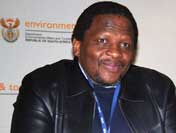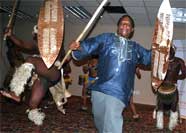|
Blood, Sweat And Tears |
 |
Tracing The Footprints For Tourism Growth
It is by now rhetoric that South Africa has reached unprecedented growth levels, surpassing expectations of a variety of research predictions and with pride earning itself a place amongst the Accelerated and Shared Growth Initiative for South Africa's (ASGISA's) priority sectors.
Writes: Edwin Sipho Rihlamvu
Dr Patrick Matlou, Deputy Director-General for Tourism at DEAT is arguably one of the most important contributors to this profile. Having joined DEAT in 2002, at a time when the tourism industry was grappling with issues of interpreting legislation, transformation, dislocated provincial coordination, low international profile, transport and airlift constraints. Understandably so and in an environment where there was inadequate human capital within the Tourism Branch, arresting these challenges seemed impossible to achieve.

Dr Patrick Matlou
at the DG Imbizo
Photo: Courtasy of
International Tourism Relations |
Adopting a cliché at the time that “Blood, Sweat and Tears” would see us through, Dr Matlou led a tiny team on a drive to recruit the most qualified historically disadvantaged individuals to join the tourism industry in an effort to creating a much more formidable human capital stable.
“We decided that if we were to drive transformation and equity within the broader tourism industry, it would then be fitting to walk the talk and effect such in our employment strategies” recalls Matlou.
Affirms Mr Benny Boshielo, Chief Executive Officer of Limpopo Tourism and Parks: “My first impression on interacting with Dr Matlou was, "wow, this man is a tourism institution."
His grasp on tourism issues, his passion on the industry, his people management skills, his resilience in the most difficult and challenging times, his love for his people, and above all his parenthood and custodianship for those of us new in the industry, qualified him to this title of an institution. Dr Matlou has endeared himself as one of the architects of tourism growth in our country”.
Tourism Legislation

... doing it the African way!
Photo: Courtasy of
International Tourism Relations
|
One of the challenges that beset the Branch was to entrench proper understanding of legislation in the tourism industry by all players. This because past pieces of legislation were skewed and biased towards a minority few, hence aggressive resistance to the new order. As a consequence efforts were made by others to discredit tourism legislation as anti-growth, and retired it as doomed to deplete arrivals to South Africa’s shores.
Hence the challenge was to be unrepentant about driving strict adherence to policy stipulations, no matter how unpopular they would be with others. Again the “Blood, Sweat and Tears” approach became handy as Dr Matlou and his charges fought battles akin to that of “David and Goliath” in order to navigate resilience amidst this resistance and at times hostile media. Indeed this determination has delivered handsome fruit!
“Dr Matlou's contribution to the tourism industry is incalculable. He is a living legend of all the milestones of post-apartheid policy formulation, rooted in the wisdom of responsible and sustainable tourism development,” comments Advocate Cawe Mahlati, Chief Executive Officer of Gauteng Tourism Authority.
Transformation
The tourism tapestry in South Africa has for a long time been characterized by a number of unwelcome anomalies in terms of equity, ownership, demographic spread and inequitable business landscape. It would thus be expected that any attempt to obviate this misdemeanor and align it with the brand-new South African democratic dispensation would be met with fierce negativity.
“We have spoken of two miracles that have transformed South Africa: the miracle of political transformation, that enabled the nation to forgive the past and accept a new political order; and the miracle of economic stability, which resulted in reduced inflation and a healthy debt-to-GDP ratio.
Our third miracle needed to be that of economic democratization. We needed to transform the tourism economy so that it is fairly shared among all population groups, unemployment is reduced and poverty is eradicated” wryly noted Dr Matlou, recalling the amount of work that was put in towards aligning the tourism face to make it what it is today.
Sindiswa Nhlumayo, Head of the BEE Charter Council at the Department of Environmental Affairs and Tourism (DEAT) confirms the rationale behind government’s aggressive attendance to transformation: “We see BEE as a benefit to the economy and business in South Africa. BEE enables economic growth and by bringing on an empowerment partner will give businesses access to new markets, which in turn will lead to business growth”.
Coordination at different tiers of government
In 1994 the main challenge was to dismantle the old "apartheid structures" and reorganize them in an inclusive, democratic and egalitarian orientation. The same principle was called for within the tourism sector. Furthermore, it became painfully evident that provincial tourism structures found themselves desperately wanting in terms of understanding their roles and responsibilities. DEAT had to lead the painstakingly long-drawn process of putting provinces on a wining streak!
Recognizing the tireless work that is attributable to Matlou in the above regard, Mr Ndabo Khoza, Chief Executive Officer of KwaZulu Natal Tourism Authority notes: “As Tourism KwaZulu-Natal we have been privileged to have had the opportunity to work with Dr Matlou for a while. He has managed to put the tourism agenda to a wider audience, particularly public sector stakeholders”.
Furthermore, there are now coordinated approaches to tackle issues that negatively affect tourism such as VISA restrictions, safety and security, transport and airlift etc. The impact of this is monumental as all stakeholders began to take ownership of the tourism value chain and are committed to its maintenance and growth.
For instance, thus far, the implementation of the airlift strategy, the result of a strong partnership between DEAT, South African Tourism, the Department of Transport and the private sector, has shown impressive increases in capacity to bring tourists to South Africa. Between September 2006 and January this year, rights for almost 1,4 million additional seats per year were secured.
Profiling Tourism Internationally
UNWTO grants the Ulysses Prize to a distinguished scholar for an outstanding contribution to knowledge in tourism, while the Awards are bestowed on projects undertaken by public institutions in tourism which merit distinction for their innovative contributions to tourism policy, governance, and areas of tourism such as the environmental, new technologies, among others.
In this case Tourism KwaZulu-Natal scooped a First Prize, Award for Innovation in Tourism Governance, which has placed its focus on the impacts of tourism and on tourism as a tool for development, involving local communities.
“The African continent can also do much better than the approximately 37 million arrivals or around 4,5% of the 806 million global arrivals (2005). Africa received only a small share, 3,1%, of the US$680 billion spent globally (2005) by tourists. The travel and tourism sector can become Africa’s strongest economic sector for direct foreign investment in future”, reasons Dr Matlou.
The adoption of the NEPAD Tourism Action is in many ways a product of relentless work that was undertaken by South Africa.
On another front, Dr Matlou played a leading role in positioning the Regional Tourism Organizations of Southern Africa (RETOSA), to market and promote the Region in close cooperation with the Region's national tourist organizations and the private sector.
Attests Mr Francis Mfune, RETOSA’s Acting Executive Director: "Dr Patrick Matlou was an active member of the RETOSA Board. He will specifically be remembered for his untiring and meticulous guidance to RETOSA to develop a Monitoring and Evaluation System (M & E) with performance indicators for Monitoring the Institution's performance”.
Dr Matlou’s passion for Africa can be found in the brief resume below:
He completed his primary-school education in Nigeria and then moved to complete his secondary education and first degree (Political Science and Geography) in Ghana in 1979. His dissertation was a comparative analysis of the Battle of Iswandlwana (1879), the Sharpeville crisis (1960) and the Soweto riots (1976).
He then went to England and completed a Masters in International Relations in 1980; his thesis dealt with the defunct East African Economic Community. He worked in Liberia as a lecturer in Political Science at the University of Liberia from 1981 to 1986 and returned to England where he completed his PhD in 1992, specializing on Botswana’s refugee policy.
Dr Matlou returned to South Africa in September 1994 after working for the UN High Commissioner for Refugees in Kenya.
Message to the Tourism Industry
“I am indeed humbled to have been, in a small way part of a process that has established groundwork for tourism in South Africa to thrive to greater heights. However, my message to the industry and those that will take after us is that we should not rest on our laurels and think we have won the battle. I propose that a bigger war to be won is that of transformation, so that all citizens of this country derive an equal share from the tourism pie, so that through tourism our lot is emancipated from the shackles of poverty, unemployment and lack of education,” noted Dr Matlou.
Encouraging officials to be steadfast and committed to service, he said, “You should always count yourselves lucky that you are able to go to work in this very competitive industry. There are many who would cherish the opportunity of finding employment, who would rather work for free in order to gain experience. Always cling dear to your work and aspire to achieve one goal everyday – contributing positively to the life of South Africans, from whose tax you derive a salary”.
Conclusion
At the close of his 5 June 2007 National Assembly debate on the Budget Vote of the Department of Environmental Affairs and Tourism, Marthinus Van Schalkwyk, Minister of Environmental Affairs and Tourism declared, “…None of the achievements that I have spoken of today would be possible without the hard work and dedication of these outstanding individuals whose commitment to consolidating the achievements of our first decade of freedom is without question”.
It is tempting, very tempting to suggest that the Minister was actually referring to the fact that tourism in South Africa is basking in the glory and limelight brought about by: “Blood, Sweat and Tears”!
Dr Patrick Matlotleng Matlou is to leave DEAT at the end of August 2007 to pursue other interests.
|
|
|
Print this window
|
|

